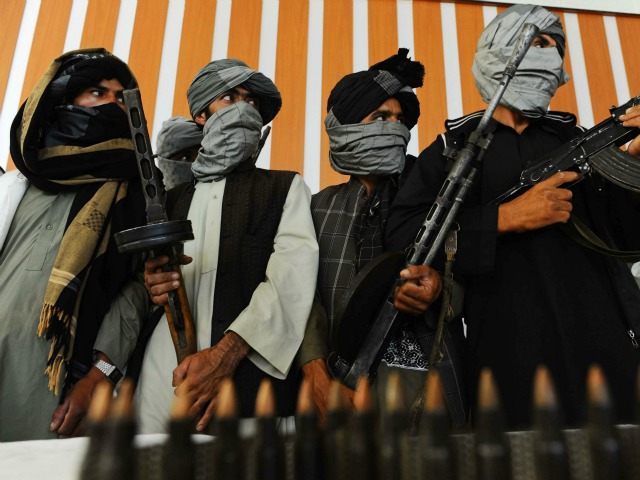WASHINGTON, D.C. — The Obama administration insisted that it continues to support the peace talks between the Taliban and the government of Afghanistan even after the terrorist group restated preconditions prior to ceasing hostilities.
Sher Mohammad Abbas Stanekzai, the Taliban’s chief negotiator and director of its political office in Qatari capital Doha, laid down the demands during unofficial negotiations Sunday between Taliban representatives and people close to the Afghan government.
Former Afghan interior minister Umar Daudzai and an uncle of President Ghani, Abdul Qayyum Kochi, met with Taliban representatives during the two-day unofficial conference, which took place over the weekend in the Qatari capital Doha.
The gathering comes as Afghanistan, China, the United States, and Pakistan, together known as the Quadrilateral Coordination Group (QCG), are in the midst of a series of meetings to pave the way towards initiating a peace process aimed at ending the Afghanistan war.
Before it even considers joining the formal peace talks, Stanekzai said the Taliban wants the complete withdrawal of U.S.-led foreign forces, the establishment of an “independent Islamic system,” formal global recognition of its Doha office, the release of certain prisoners, an end to the “poisonous propaganda” against the terrorist group, and for the United Nations no longer target its members with travel and financial restrictions.
The Taliban also wants “direct negations with the United States to discuss issues such as agreeing on a deadline for withdrawal of foreign forces from Afghanistan and removal of Taliban leaders’ names from a U.S. list of rewards for their arrests,” reiterated the Taliban negotiator, reports Voice of America (VOA).
Breitbart News asked the U.S. Department of State (DOS) to comment on the list of demands the Taliban said must be met before it engages in the formal talks.
“The United States continues to support an Afghan-led and Afghan-owned peace process as the surest way to end violence and ensure lasting stability in Afghanistan and the region,” responded Mark Toner, a DOS spokesperson, in statement to Breitbart News.
“We support President Ghani’s call on the Taliban to join peace talks with the Afghan Government,” he continued. “The Taliban have a choice: to join good-faith negotiations for peace, or continue to fight a war in which they are killing their fellow Afghans and destroying their country. If they choose the latter, they will continue to face the combined efforts of the Afghan security forces and their international partners.”
Taliban and Afghan government envoys – in addition to civil lawmakers, society and peace activists – were all invited to the two-day conference for informal negotiations.
However, no government officials attended the meeting, according to foreign ministry officials in Kabul.
While the Taliban has expressed support for the informal negotiations, dubbed the Track Two discussions, it is skeptical of the official negotiations known as the four-way peace process and quadrilateral talks.
The four-way peace process involves senior officials from the United States, China, Afghanistan and Pakistan engaging in discussions aimed at laying the foundation for direct peace talks between the Afghan government and the Taliban.
“We will not know the Taliban’s positions until they have entered into a formal negotiation process,” declared the State Department spokesperson.
Toner’s comments come after the Taliban’s Stanekzai’s list of preconditions to ceasing hostilities were reported by various news outlets.
“As part of the outcome of any process, the Taliban and other armed Afghan opposition groups must end violence, break any associations with international terrorism, and accept Afghanistan’s constitution, including its protections for women and minorities,” added Toner. “These ‘end conditions’ are a means to protect the significant gains made by Afghanistan over the last 14 years.”
The Taliban negotiator at the informat gathering reportedly claimed that the Taliban was committed to civil liberties such as freedom of speech and women’s rights “in the light of Islamic rules, national interests and values.”
VOA quotes unnamed Taliban sources as saying that Afghan President Ashraf Ghani, in a written message to the informal conference, accepted the Taliban as a political opposition, adding that his administration was ready to hold direct peace talks with the terrorist group.
Ghani’s alleged message was delivered after his administration expressed opposition to the unofficial Doha event, arguing that it is a distraction from parallel efforts by Afghanistan, China, the United States, and Pakistan aimed at restarting formal negotiations. It also said the Taliban’s participation in global forums grants the terrorist group undue legitimacy.
The unofficial talks were organized by the Pugwash Conferences on Science and World Affairs, an international Nobel Prize-winning group dedicated to conflict resolution.
Christopher Sherwood, a Pentagon spokesman, told Breitbart News that the United States supports the formal negotiations.
“The U.S. is an invited observer, and supports the quadrilateral talks,” he said, when asked to comment on the demands made by the Taliban at the unofficial meeting in Doha. “We refer you to the government of Afghanistan for comment on the status and specifics of the negotiations.”
Spokesmen for U.S. Forces-Afghanistan and the NATO Resolute Support mission in Afghanistan referred Breitbart News to the State Department when asked to comment on this report.
Ambassador to Afghanistan Michael McKinley from the American embassy in Kabul, a component of the State Department, has been representing the United States during quadrilateral negotiations.
Afghanistan has experienced a rise in attacks by the Taliban since the U.S. and NATO ended their combat mission at the end of 2014.
Although the U.S. military claims the group controls less than 5 percent of the country, various assessments allege that the Taliban controls far more territory.
In fact, the studies claim that the Taliban controls more territory now (about 10 percent of Afghanistan) than at any time since the American invasion ousted the terrorist group in 2001.

COMMENTS
Please let us know if you're having issues with commenting.